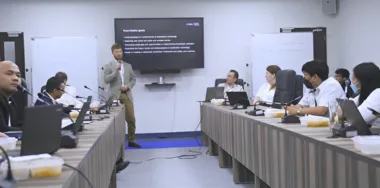| Getting your Trinity Audio player ready... |
The Bitcoin whitepaper, Dr. Craig S. Wright’s copyright claim to it, as well as his intellectual property have recently fallen onto the radar of many blockchain and digital currency enthusiasts.
In his latest blog post, “Open Source and Liability,” Dr. Wright addressed many of the current events around the Bitcoin whitepaper, enterprises in Silicon Valley that pilot the BTC protocol, copyright, and intellectual property.
The main reason that copyright and intellectual property related controversy around the Bitcoin whitepaper has come to the surface is because corporations and individuals published the Bitcoin whitepaper in an attempt to pass Bitcoin off as a system that it really isn’t (as described in the whitepaper). That being said, anyone can use the whitepaper anywhere they want as long as they are not using it to illegally pass off technology that does not follow the whitepaper as Bitcoin.
“Several individuals in what is termed the ‘cryptocurrency space’ have started to promote a misleading and false premise: that open-source software is necessarily free and comes without copyright,” says Dr. Wright; and this is where corporations and individuals working on open-source software run into another issue.
Just because they are working on something open-source, it does not mean that they aren’t liable for their actions. Dr. Wright goes on to explain the four different types of business structure—individual, associations and partnerships, corporations, as well as trusts and foundations—and talks about how they function and where the liability falls in each structure. He also addresses individuals that operate via the money they received from donations, and how those individuals must register as a charitable donation, otherwise, they must pay tax on the money they receive.
He then goes on to explain how companies located in Silicon Valley have found a way to mitigate operational risks from themselves by open-sourcing projects.
“Twitter, Facebook, Google, and a swathe of other Silicon Valley companies have lowered the production costs faced by their companies, managed to hand risk to third parties, and foregone responsibility, whilst getting uninformed and legally untrained software developers to believe that they were doing good…With systems involving ‘cryptocurrency,’ including BTC Core, the individuals behind the associated website will try to tell you that they are only an open-source group, and hence there is no liability. You cannot simply remove liability from your actions by saying you do not have liability. It does not matter what the website says; if you become part of such a group, you are liable for the actions of the group.”
And this is where the group of developers working on the open-source protocol as well as the corporations that have tried to mitigate their risk run into a big problem. What the corporations are telling the developers that they are building, is not what the product they believe they are building is legally defined as. In other words, the corporations and developers are trying to pass the BTC protocol off as Bitcoin, when BTC has really diverged from the blueprint laid out in the bitcoin whitepaper a long time ago.
“Likewise, actions such as passing a system off as another can leave each of the developers liable for the actions of a few malicious individuals. Ignorance is not a defence…In accordance with the common test provided through Reckitt & Colman Products Ltd v Borden Inc [1990] 1 WLR 491, the development of an alternative system, changing something that was set in stone, and misrepresenting it as the same product is an act of passing off. In the case of BTC Core, you cannot decide that a community now owns a project. I did not ever hand the project over. I explained that the project was based on a protocol that had been set in stone.”
Dr. Wright’s blog post makes it very clear why legal issues are beginning to arise around the Bitcoin whitepaper. You also begin to understand who is at fault and who violated the copyright and intellectual property claims that Dr. Wright has. As he notes, “ignorance is not a defense,” so there are slim chances that the companies and individuals who have violated the law will escape this legal issue unscathed.
To learn more about the implications that working on open source technology has and who the liability will fall on when the shoe drops, head over to CraigWright.net and read Dr. Craig S. Wright’s latest blog post, “Open Source and Liability.”
New to blockchain? Check out CoinGeek’s Blockchain for Beginners section, the ultimate resource guide to learn more about blockchain technology.








